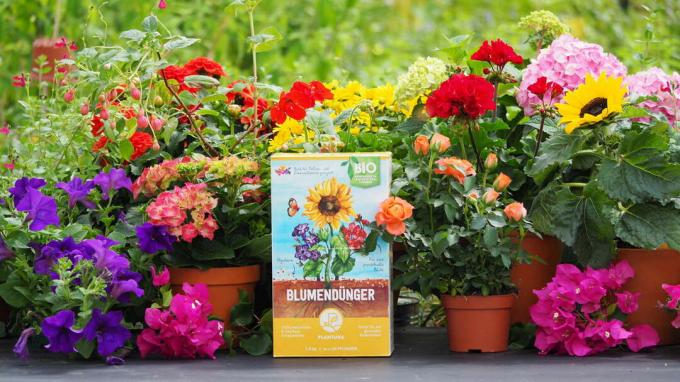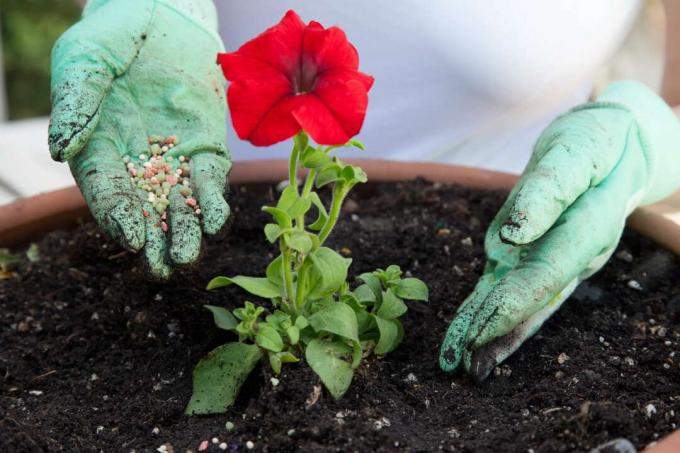Proper fertilization is essential to ensure that the garden blooms abundantly. We show what flower fertilizer is made of and why it is so important.

Your own vegetable and fruit harvest or a dense lawn are certainly something very beautiful. But what is more pleasing to the eye than a colorful pile of flowers, which bees and butterflies dance around and smells wonderfully? Anyone who owns a flower garden has paradise on their doorstep, always with a bouquet of flowers as a gift - and should rely on the right fertilizer. Because the extravagant flowering plants have very high demands.
contents
- Why do flowers need a special fertilizer?
- What is flower fertilizer made of?
-
Flower fertilizer in the test
- Mineral flower fertilizer
- Organic flower fertilizer
- Organic mineral and organic flower fertilizer
We explain to you why the colorful beauties need a special fertilizer, what they are made of can and where the advantages and disadvantages of mineral, organic and organic-mineral fertilizers lie.
Why do flowers need a special fertilizer?
The term “flower” does not exist in technical jargon, so what is a flower fertilizer? In general, we always speak of flowers when we mean annual flowering plants. Perennials and biennial plants can also be included, but they are only left on one area for one year.

Summer flowers need special fertilizer for the following reasons:
- Summer flowers are often demanding exotic species that have been bred to have a rich set of flowers. The numerous flowers also cause the high nutritional requirements
- Summer flowers from professional production are used to high levels of nutrients and optimal growing conditions
- When planted outdoors, summer flowers experience a veritable plant shock; optimal soil preparation and nutrient supply can help alleviate this
- The root system of summer flowers is by no means as pronounced and efficient as that of perennials, which is why good availability is all the more important
- Summer flowers complete, in a very short time, sometimes enormous vegetative growth spurts, which further increases their need. A good example is the sunflower
- Most summer flowers require the main nutrients nitrogen, phosphate and potassium oxide in a ratio of 9: 3: 14, so that a corresponding special fertilizer is available
What is flower fertilizer made of?
Become flower fertilizer mineral, organic, organic-mineral or as Organic fertilizer offered. In addition to the main nutritional elements mentioned above, other nutritional elements are often also included. While mineral fertilizers only contain nutrient salts in concentrated form, organic fertilization also adds structural material to soil fertilization. All types of flower fertilizers have their advantages and disadvantages, so we will draw a comparison below.
Flower fertilizer in the test
In order to meet the high demands of the spoiled summer flowers and to be able to enjoy their splendor, you should choose the right fertilizer. Your gardening style or your ecological awareness may also play a role in your choice.
Mineral flower fertilizer
Mineral flower fertilizer is available in solid and liquid form. In solid form, the nutrients are in the form of salts of the nutrient ions; in liquid fertilizers, these ions are held individually in the aqueous solution by so-called chelates. Mineral fertilizers often have high nutrient levels and the simplest products are reasonably priced. What all mineral fertilizers have in common is their very rapid action, which is suitable for the targeted treatment of acute nutrient deficiencies.

Unfortunately, mineral fertilization also has some significant disadvantages:
- Good solubility can lead to overfertilization damage and leaching, especially liquid fertilizers are quickly washed away in the open and get into the groundwater
- If a soil is only ever fertilized with mineral fertilizers, its quality will decrease in the long term. humus is degraded and the important soil life is damaged
- Mineral fertilizers can contain the toxic heavy metal cadmium, which can get into your garden soil in this way and accumulate there
- The production of mineral fertilizers is energy-intensive and uses limited fossil resources
Organic flower fertilizer
at organic fertilizerer it is shredded waste from the food and beverage industry. Mostly animal waste is used for this. Organic fertilizers work more slowly than mineral fertilizers because the nutrients they contain are first extracted and released in the soil by beneficial microorganisms.

They have a high price in relation to the nutrient content, but organic fertilization also has the following advantages:
- In addition to the main nutritional elements, organic fertilizers always contain various important trace elements
- The application improves the soil properties, promotes soil life and stabilizes or increases the humus content: This is known as soil fertilization
- A slow-flowing release largely prevents over-fertilization and leaching
- The natural long-term effect supplies the plants with little effort
- The production is less energy-intensive and recycles nutrients, it is therefore resource-saving
Organic mineral and organic flower fertilizer
Organic-mineral flower fertilizers and organic flower fertilizers contain both organic and mineral components.
- By combining the opposites, an optimal fertilizing effect can be achieved: a quick effect at simultaneous soil care, the prevention of leaching and over-fertilization, a natural long-term effect and protection of resources
- Classic organic-mineral fertilizers have a lower organic content than organic fertilizers
- Organic fertilizer only use mineral components that are also approved for organic farming and may even contain living microorganisms
Even with ours Plantura organic flower fertilizer it is such an organic fertilizer. In order to live up to its name, the raw materials used only come from verifiably organic economic sources and the purely plant-based recipe can also be enjoyed by vegan flower lovers use it without hesitation.

tip: We recommend that you use an organic long-term flower fertilizer of organic quality. Because instead of completely renewing the floor on a regular basis, it should be better cared for. Such well-tended soil can meet the high nutrient and water requirements of summer flowers.
